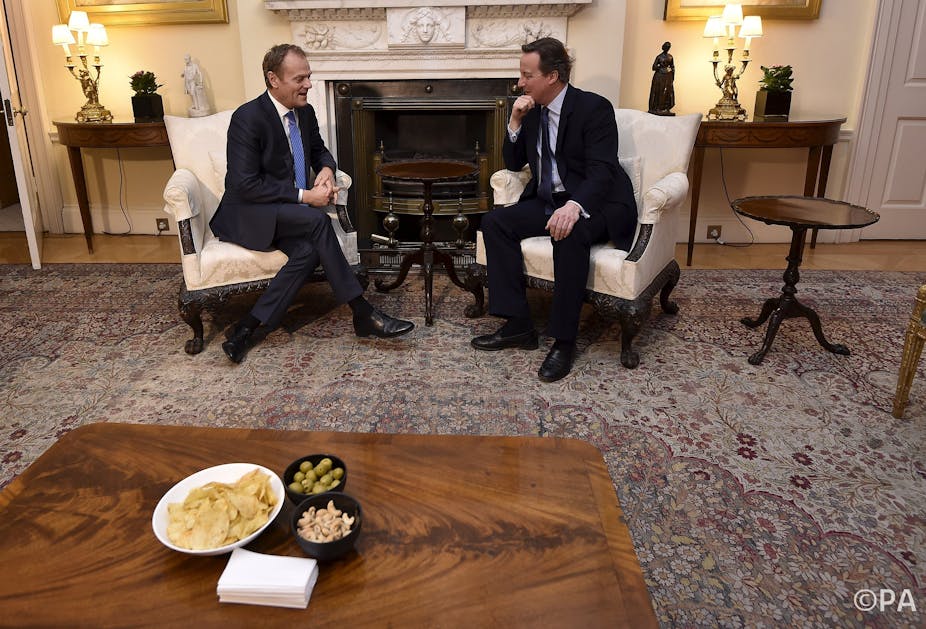Behind closed doors in Downing Street, an important meeting is taking place. David Cameron, the British prime minister, is trying to reach a deal to renegotiate the UK’s position in the European Union. The stakes coudn’t be higher – but what is actually happening?
Who is David Cameron meeting?
Cameron is meeting Donald Tusk, the president of the European Council – the body that brings together the leaders of all European member states. Tusk has come to London to meet Cameron under the banner of “EU reform”. In reality though, the negotiations seem to be about one thing only – banning benefits for EU migrants living in the UK.
The two need to reach a deal to complete the proposal for renegotiating the UK’s place in the EU before the European Council next meets (on February 18). These talks could be decisive in setting a date for the European referendum.
What are the main points of contention?
Cameron wants to completely ban migrants from claiming state benefits (even if they have a job) for as long as four years after they arrive in the UK. The EU is not willing to allow this because it would mean discriminating against non-UK EU citizens – which is against the rules and the spirit of the European Union. The EU treaties consider passport holders of EU member states as European Union citizens, not just workers.
The president of European Council and other EU countries such as Germany do, however, seem more willing to grant the UK and other countries an “emergency brake”.
What is the ‘emergency brake’?
The emergency brake is a measure outlined in the Treaty of Lisbon, which sets out the constitutional basis of the EU.
Each member state can ask the European Council to grant it temporary exemption from its obligations towards other European citizens if certain areas of its system (for example, its health service or benefits system) are being overburdened to the extent that its fundamental principles of social security are under threat.
In this particular case, Cameron is arguing that the number of EU migrants claiming benefits in the UK is putting too much pressure on public finances. He wants to restrict their right to claim.
What happens if the UK is allowed to use the brake?
The European Council would start taking steps to suspend the UK’s obligation to provide benefits to EU migrants. It’s not clear how long it would be allowed to use the brake. For one thing, the emergency brake is supposed to be applied to new legislation, not for existing laws. If Cameron were allowed to apply the brake, it would be an exceptional concession.
How long the brake could be applied is also part of the negotiations between Cameron and Tusk, but somewhere between two and seven years is what interested parties have disclosed.
In reality, the process is likely to be an administrative nightmare. Every time someone applies for benefits, they would have to produce valid ID (passport or national ID) and somehow prove when they arrived in the UK. This might end up angering British people more than migrants. They would presumably need to carry their passport with them to claim benefits to prove their citizenship. Moreover, when the emergency brake terminates, the UK government will have to consider whether it maintains the new order (ID required) or revert to the previous system.
What happens next if these talks fail?
That’s unlikely. Politicians love to agree on things at the very last minute. The talks going on right now might not produce a deal but more discussions would be scheduled. It seems unlikely that the members of the European Council would be willing to break up the EU for a minor dispute such as this.
What is the best-case scenario?
It depends which way you look at it. Eurosceptics in Cameron’s Conservative Party will accept nothing short of a Brexit so are unlikely to be satisfied by any outcome from these talks.
An emergency brake could work for party members in favour of EU reform, yet they may still be reluctant to accept a provisional or temporary measure. Cameron is likely to use this achievement as a promise of further negotiations.
What is the worst-case scenario?
That the EU refuses to make any concessions. If the European Council digs its heels and accepts no change, then Cameron will have no option but to campaign for a Brexit in the referendum.
When will the referendum happen?
The problem here is that we won’t really know until it becomes clear whether the European Treaty will have to be amended to accommodate British demands. An emergency brake could be implemented without reforming the treaty, but something more permanent could not.
The referendum has to take place before the end of 2017 but there also has to be a period of at least ten weeks between the publication of a report containing the results of the negotiations and a vote. So the vote is likely to take place around ten weeks after a European Council meeting. These are scheduled for February, March and June. The only feasible way in which the referendum could be held in June is if there is agreement in February. Otherwise, it would have to move to September, since holding a referendum during the summer months would not work, for a variety of reasons.

